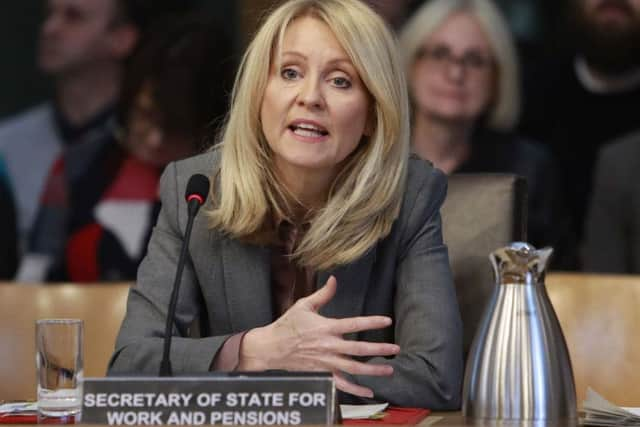Kenny MacAskill: The Nasty Party is back
Speaking softly and without triumphalism, she said; “Where there is discord, may we bring harmony. Where there is error, may we bring truth. Where there is doubt, may we bring faith. And where there is despair, may we bring hope.”
Many, including me, doubted her sincerity and feared for what might befall the country, and not without good reason. – for the miners’ strike, riots, mass unemployment and the hopelessness that came with it for so many were her legacy. Harmony there was not and despair there most certainly was, despite her protestations.
Advertisement
Hide AdAdvertisement
Hide AdShe ruled imperiously though for many years before it all fell apart, as the country tired of her discord and outrage over the poll tax brought her down. Her replacement with the gentler persona of John Major was still unable to save the Tories from an electoral wipe out in 1997, as the brand proved toxic across the entire country.


Such was the antipathy that even Theresa May, speaking to the Tory party conference in October 2002, acknowledged that they had to face up to the “unfortunate truth” that they were “sometimes perceived by the public as the Nasty Party”. It was a long way from one-nation conservatism that had once been espoused by patrician grandees like Harold Macmillan or Alex Douglas-Home.
As a consequence, the Tories had to reinvent themselves, but leader after leader failed to reduce the level of toxicity, from the boyish William Hague to the eccentric but wooden Iain Duncan Smith, until a young David Cameron used his bonhomie to mask the Bullingdon Club ethos that lay behind his leadership.
His term in office came to an inglorious end with his spectacular misjudgement over Brexit but whether through coalition, albeit with supine Liberal Democrats, or through cuts masked by claims of required austerity, the veneer of decency remained. We were all in it together after all, as he claimed!


Fast forward to 13 July 2016, when May took over as Prime Minister and her acceptance speech bore all the hallmarks of Thatcher’s address 37 years before, rather than actualities of the Iron Lady’s 11-year tenure. The new and, in many ways, accidental Premier – given the circumstances in which she had come to power – said that her predecessor had “led a one-nation government”, that she would be “fighting against burning injustices” and that she sought “a country that works not for a privileged few, but for everyone”.
Initially, it appeared successful as election results on both sides of the Border seemed to offer the Tories opportunities amongst working people and other sections of the electorate that once shunned them. The image of a moderate Prime Minister challenged by extremists on either side and deftly trying to steer a course through stormy Brexit waters was conjured up. North of the Border, the “couthy” Ruth Davidson belied the Tories’ image as the party of the rich and reinvented it as the party of the union. Old political allegiances were breaking down just as the old image of the Tory Party was fading.
But, the mask’s now slipping from the Conservative Party and the image of the “Nasty Party” is fast returning. A week’s a long time in politics, as they say, and the UK Government has gone from the ‘strong and stable’ administration they wished to show – meeting out justice to the likes of Assad – to a bunch of heartless incompetents. Exposed for inflicting injustice on immigrants who answered the Empire’s call in its time of need and imposing misery on the poor, through heartless benefits checks on rape victims never mind the destitute.
It had been faltering for a while as a hopeless election campaign saw them almost snatch defeat from the jaws of victory, then a grubby deal with the DUP and lateness and a lack of sensitivity in responding to the Grenfell fire were sure signs of lack of awareness, as well as understanding.
Advertisement
Hide AdAdvertisement
Hide AdThis week saw them exposed both on policies and competence. Home Secretary Amber Rudd’s performance in Westminster was as hapless as Esther McVey’s was heartless at Holyrood, one displaying a lack of control over her department and the other a complete lack of empathy for victims. But the responsibility rests with the Prime Minister because the ineptitude of the Home Office predates the current incumbent and the blame for wider social policy firmly rests with her.
Both May and Davidson have been remarkably lucky in many ways, no bad thing for a politician and what Napoleon wanted his generals to be. May managed to avoid significant flack for a tenure as Home Secretary that was far from glorious to say the least – alienating the police, presiding over a prison and probation service shambles and creating an immigration system that’s as incompetent as it’s cruel. Davidson came to power and was able to rally her party to the union, which to be fair she did with aplomb. However, her image as a moderniser and moderate is falling apart as u-turn follows retreat on almost every issue related to the EU. On social policy, calling out the Scottish Government for perceived failures and demanding ever more is untenable when she now has a Westminster group and it’s there that the cuts are coming from.
Of course, that doesn’t mean that the Tories are doomed. Major won an election victory against the odds and Jeremy Corbyn seems unelectable at the present moment. Up in Scotland, tiredness from and with the SNP could see the Tories continue to challenge.
However, the sheen has most certainly come off both May and Davidson, as the rhetoric is not living up to the reality, any more now than it did decades ago. The treatment of the Windrush generation and the crass insensitivity of Universal Credit make the Tories look like the Nasty Party once again.
